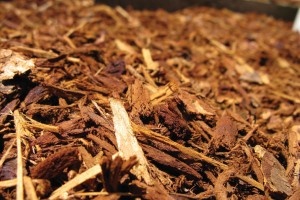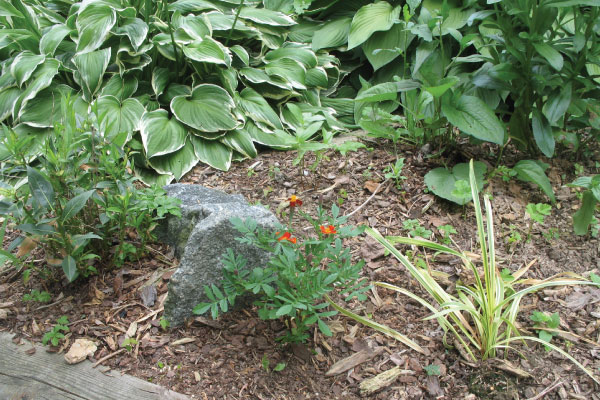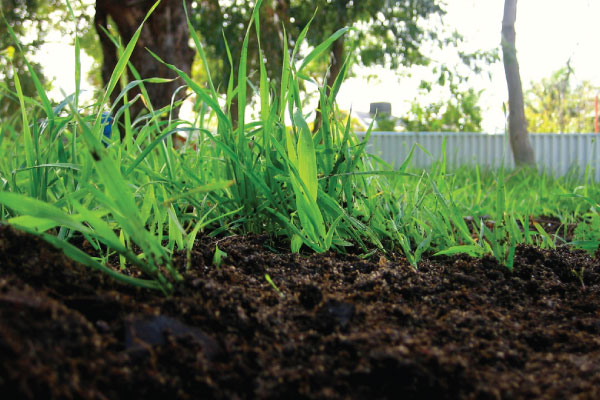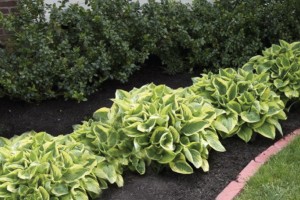THE BENEFITS OF USING MULCH IN YOUR GARDEN
Those of us with a green thumb have two challenges when it comes to gardening: maintaining a healthy and moist garden bed, and keeping the weeds from invading. Daily watering is not always possible for a variety of reasons, including conservation of water and summer watering restrictions. Regular weeding, especially with a large garden plot, requires not only a good amount of time, but also puts repetitive strain on knees and back which can hinder a gardener’s ability to keep up with the job. Reducing the amount of energy and water required to maintain a garden can be found in utilizing more sustainable gardening practices. One excellent option is to introduce mulch to your garden.
THE KEY BENEFITS OF USING MULCH IN YOUR GARDEN

There are a number of benefits of using mulch in your garden; here are a few that may encourage you to get started.
- Keeps the weeds away. A layer of mulch on top of the garden soil may be the best solution to creating a weed-free bed. A good coating of mulch will inhibit the germination and growth of weeds in your soil.
- Holds in moisture and nutrients. Not only are weeds an embarrassing sight for sore eyes, they can steal both nutrients and water from the plants in your garden. Laying mulch will help the soil hold in its moisture and nutrients so the plants can absorb what they need, and organic mulch will also release additional nutrients into the soil. Laying mulch will also help ensure your soil will not dry out too quickly, especially while at work during a hot summer day, or on vacation and asking your neighbour to water for you.
- Regulates soil temperature. Mulch also helps regulate the temperature of the soil so plants or trees don't get stressed from high to low fluctuations. This means that adding mulch to your garden can actually be beneficial not only in spring and summer, but also act as a protectant for your soil and year-round plants in the cold and wet weather of winter months.
- Makes a home for the bugs you want, and repels the ones you don’t. Mulch can increase biodiversity in your yard by giving a variety of insects and other tiny creatures homes and shelter, such as earthworms who continue the process of improving soil structure. Certain types of mulch can also help repel ticks, gnats and fleas.
- Protects the soil from the both nature and people. Mulch breaks down very slowly, protecting from the elements such as the drying heat of sun, but also from heavy rainfall, preventing it from becoming too compact, or even eroding. A stray weed whacker or lawn mower that comes too closely to your garden can also do damage, but mulch can protect your plants by providing a buffer.
To receive the best benefits from using mulch in your garden, add a layer of at least 5 - 7.5 cm (2 - 3 inches) and maintain it as long as you have plants in your garden. A vegetable garden will appreciate the added support for its season, while trees and shrubs in your yard can benefit all year round.

WHAT TYPES OF MULCH ARE THERE?
There are many types of mulch to choose from, but most of them can fall into one of two groups.
ORGANIC: This includes wood chips, leaves, compost, peat moss, grass, pine-needles and straw. This may be the superior of the two because as organic mulch decomposes, it will add beneficial organic nutrients to your plants. Be careful to ensure the grass clippings or leaves used do not contain pesticides or fertilizers, as these can contaminate the natural processes of decomposing.
INORGANIC: This includes stones or rubber chips or any similar material. These mulches will still inhibit weeds and moisture loss, but will not improve your soil condition or add any nutrients.
Mid-spring is the best time to lay down mulch, in order to keep plants at their healthiest from the start. If this is your first time adding mulch, remember to weed your bed thoroughly before you begin. If you already have a layer of mulch from the previous season, be sure to break it up, or remove some of it, before adding a new layer. If the layer gets too thick when adding to existing mulch, your mulch might not decompose and will hinder the possible root growth. Be sure to stay within the 5 - 7.5 cm range at all times.
While mulch can benefit your trees, be sure not to pile it up around the trunks of trees. Excessive mulch can rot the tree's trunk and will create a haven for insects that will damage the tree. It also encourages the tree to grow a secondary root system away from the rot. When this happens, the original, deep roots can start to wither and make your tree vulnerable in dry spells. Be sure to keep mulch 6 - 12 inches away from the base of your trees or shrubs The same holds true with your plants: be sure to give your plants some breathing room by keeping mulch about 2.5 - 5 cm away from the plant crown.
You have prepared your garden, planted, and added the necessary layer of mulch: the hard work is done! Watering should now be very easy. At the beginning of the season, and for the first 3 - 4 weeks after planting, a deep watering that thoroughly soaks the garden will be needed at least once a week. If you have great soil, a nice layer of mulch and water efficient plants, your garden should thrive off natural rainfalls only (depending on the season). If you add plants later, or experience any times of drought, more water will be necessary. If you are growing crops to eat, once food begins to grow, you may need to water more often as your crops will need the excess water to create lush and nutritious food.

Interested in experiencing the benefits of using mulch in your garden? Let us know!



